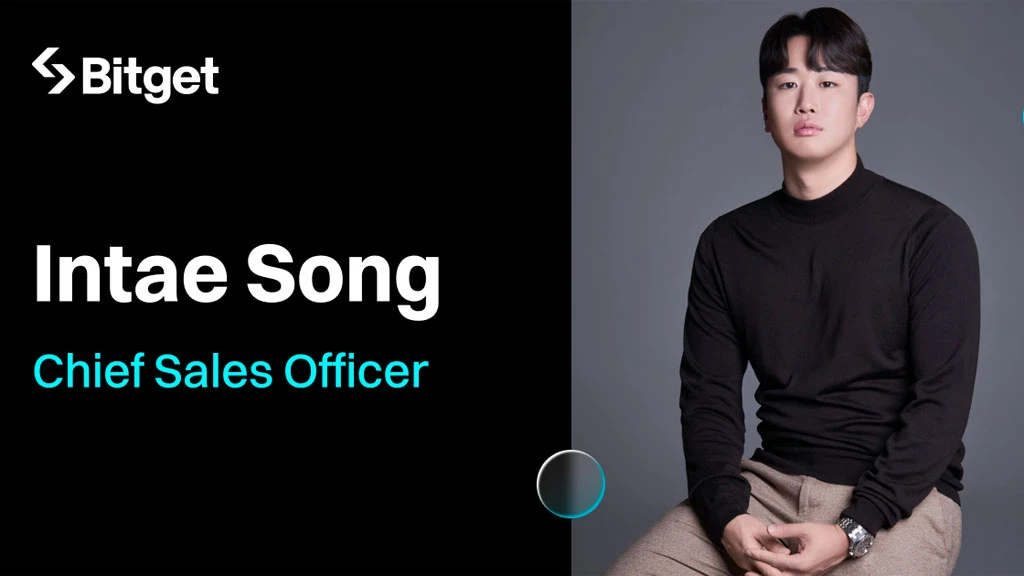从个人投资者成长为 Bitget 的全球首席销售官,Intae Song 在本文分享了自己进入加密行业的契机与挑战,回顾了 Bitget 创业早期的团队氛围和发展历程,详细介绍了他在全球扩张过程中的策略与经验,并就合约市场的未来、机构投资者的角色以及区块链与 AI 的结合发表了见解。他特别提到,坚持每周与两个客户面对面交流,这一习惯帮助他及时捕捉市场变化,更有效地调整战略与产品方向。他还强调了持续学习和适应市场变化的重要性,并给出对新入行者的建议与忠告。

本文为作者个人观点,不代表吴说观点。
1、您最初是如何以个人投资者的身份进入加密行业的?当时有哪些关键契机或灵感?这个过程中遇到的最大挑战是什么?又是怎样克服的?
最开始进入加密行业的过程并非一蹴而就。作为个人投资者,我最初关注的其实是传统金融体系中的一些低效问题,尤其是传统金融市场的结算周期和跨境支付的障碍。随着对加密货币技术和区块链的深入了解,我意识到它不仅能解决这些问题,还能创造全新的金融互动方式。对这种技术的潜力产生了兴趣,才决定全身心投入进去。
在这个过程中,我面临的最大挑战之一是如何应对加密市场的高度波动性以及其中的信息噪音。早期我也曾对一些技术性细节感到困惑,如何从噪音中提取出对投资决策有用的内容是一个比较大的挑战。有时候,市场的极端情绪也会让人陷入盲目跟风的困境,如何保持理性,做出长期有效的判断,是我逐渐克服的一个难题。
最终帮助我理清思路的方法,是用分析传统投资的框架来看待加密行业。专注于项目的基本面和实际应用,而不是盲目追逐市场热点。这种思维方式帮助我逐渐分辨出哪些是信号,哪些是噪音,也让我对加密行业有了更坚定的信念。
2、以早期员工的身份加入 Bitget 时,当时的团队规模及公司氛围是怎样的?有哪些让您印象深刻的创业故事?
加入时,Bitget 还是一个不到 50 人的小团队。我的部门只有三个人,由于人手有限,每个人都身兼多职,但我们有一个共同的信念 — — 加密货币能够重塑传统金融。尽管行业的学习曲线陡峭,但我们始终保持实干精神,推动事情向前发展。众所周知,加密行业的变化速度堪比光速,而在创业初期,我们几乎是在与时间赛跑,不仅要打造符合市场需求的产品,还要构建稳固的基础设施来支持庞大的交易量,同时不断推出创新功能。
印象深刻的一次经历是在 Bitget 期货市场上线的早期阶段。为了排查一个“可能导致极端行情下用户无法顺利开仓平仓”的关键问题,我们团队在下班后仍然留在公司调试,确保能够按计划顺利上线。整个过程中,团队气氛紧张,但大家相互支持、并肩作战,只为按时交付。除了技术问题,客服方面也遇到了一些挑战。由于当时还没有专职客服,我亲自处理了大量用户反馈。这些经历让我深刻体会到,团队协作、灵活应变才是成功的关键。
当时的团队文化虽然高强度,但高度协作。我们目标一致,对成长和进步有着迫切的追求,因为整个行业都在努力赢得市场的信任与认可。我相信,这种思维方式至今依然适用 — — 始终保持前瞻性,预判用户需求,积极塑造我们想要深耕的行业。
3、您在 Bitget 的全球扩张过程中主要负责或参与了哪些工作?遇到过哪些重大挑战?可以分享一个在开拓新市场时印象最深刻的案例吗?
成功的交易所都有自己的优势,而我的核心职责之一就是通过合约交易挖掘 Bitget 的优势。不过,把 Bitget 推向不同市场不仅仅是上线合约交易这么简单。我们还需要真正理解各地的文化差异,因为这些差异直接影响交易习惯,而且每个地区的监管要求和牌照问题也都不同。如果我们不了解这些因素就贸然进入新市场,很可能会适得其反;但如果动作太慢,又可能错失先机。所以,我需要和法务团队紧密合作,同时和当地建立联系,确保我们的产品既能满足本地需求,又符合全球标准。
通过对各个市场的深入了解,我们能为不同地区量身打造更合适的产品,而不是简单套用一个“统一模式”。虽然在扩展过程中没有哪一件事特别突出,但我从中学到的关键经验是,成功的市场拓展取决于正确的进入策略,而这一点离不开与相关监管机构的紧密合作与协调。
4、从销售主管到业务合伙人,再到如今的 CSO,不同角色之间有哪些变化与升级?能否向读者介绍一下这些职位的具体工作内容?后续的重点工作是哪些?
其实我的核心职责并没有太大变化,主要是聚焦拓展 Bitget 的合作网络和销售机会。但现在,我的工作范畴增加了全球化扩展的维度。
接下来的重点工作会集中在几个方面:
全球市场扩张:继续推动 Bitget 在新兴市场的扩展,尤其是在东南亚、拉丁美洲和其他未充分开发的地区。我们会根据各地区的文化差异、法规要求以及市场需求,量身定制不同的产品和战略,以确保在全球范围内实现最大化增长。
创新产品与服务:随着加密行业的不断发展,我们将继续关注市场需求,推动平台创新。比如最近推出的创新型产品 Bitget Seed、 Early Hunter airdrop 等,帮助用户在早期发现并捕获优质资产。
深化机构和VIP业务:打造更加多元化的用户结构;机构用户将享受 7*24 小时专属服务与API接口升级、专属的数据后台、享受更低的交易费用、更快的交易速度、更高的交易限额、灵活配资以及定制化财富管理服务。
监管合规与行业合作:随着全球各地加密监管的逐步完善,我们将更加重视合规性,确保公司在各个市场的运营都符合当地法律法规。同时,我们还将加强与行业内外的合作,建立更强大的生态合作伙伴网络,提升 Bitget 的市场竞争力和品牌影响力。
5、Bitget 以狼性企业文化著称,这点在销售团队是否更为明显?当前销售团队的主要目标是什么?如何看待合约市场的前景?
就像我之前提到的,Bitget 的核心战略是打造差异化优势。“狼性”不如说 Bitget 的企业文化是贯彻实用主义,一切以结果为导向,有结果的人会得到充分的授权与奖赏,简单高效。 比如去年,我们拿出 7000 万美金奖励 1700 余名员工,而且不管市场是牛市还是熊市,年终奖从不迟到。我们更多的是为共同目标而协作奋斗,而非内部消耗。协作是我们的重要准则,我们也保持着开放的反馈机制。销售团队的使命就是推动加密货币走向主流。虽然外部环境确实有助于行业的发展,但销售团队必须时刻关注市场需求的变化和监管趋势,确保 Bitget 始终处于投资者的优先选择之列。
我认为,合约市场未来将更多面向专业交易者和机构投资者。传统金融行业的衍生品主要用于对冲和杠杆策略,加密市场的发展路径类似,随着机构资金的进入,合规化和结构化趋势将加速。目前,合约市场的核心用户仍是高频交易者和套利者,但越来越多的机构开始配置加密资产,并探索更复杂的交易策略。随着监管环境的完善,市场流动性和深度会进一步提升,甚至会出现更复杂的定制化衍生品。我们会持续优化产品,为个人和机构提供更丰富的交易工具和稳定的交易环境。
6、听说您至今仍保持每周见 2 个客户的习惯,这个习惯对您的帮助是?
是的,这是入职以来一直保持的习惯,未来也不太会停掉。这个习惯对我来说很有帮助。可以直接了解他们的需求和反馈,帮助我们不断改进产品和服务。我觉得和客户面对面的交流是最直接、最有效的方式之一,能够更真实地捕捉到他们的想法以及市场的变化。像 Bitget Seed 这样的创新功能,实际上是客户提出的一些创意,我们内部团队把这些想法转化成实际的产品,进行开发和上线。
这种交流不仅让我能更快发现新机会,也能及时帮客户解决问题,让我在做决策时更有底气,因为我可以根据客户的实际需求调整我们的策略。而且,这样的沟通加深了彼此的信任,也让我们能建立更长期、更稳固的合作关系。
7、目前持有哪些加密货币?最大的持仓是什么?最大的山寨和 Meme 持仓是什么?如何看待当前的山寨遇冷和 Meme 的相对火热?
作为个人投资者,需要保持对市场的敏锐度,在个人投资策略中结合行业趋势进行配置。目前,我的加密投资组合涵盖了 BTC、ETH 等主流资产,以及部分优质的山寨币和新兴赛道的项目。
BGB 在我的投资中有着特别的地位,它不仅仅是一个投资品,更像是与我们一起“成长”的伙伴。它的价值增长,也代表了市场对我们的认可,这种正向反馈也能激励团队不断前进。
关于当前市场趋势,山寨币近期的降温主要受到宏观环境、资金流向和市场情绪的影响。相比之下,Meme 币的火热反映了短期资金偏好的变化,尤其是在社区文化和市场情绪的推动下,Meme 资产往往能够在特定阶段获得超额收益。但长期来看,优质项目仍然会凭借技术创新和实际应用价值跑出来。在当前市场环境下,投资者既要关注短期市场情绪,也要做好风险管理。
8、当前在加密领域最关注的赛道是什么?如何看待后续市场的走势?
我一直在关注加密市场的结构性变化和长期的增长机会。目前,我最关注的几个方向包括衍生品市场、机构化交易和 AI 和区块链的结合。
衍生品市场方面,合约交易市场越来越成熟,机构和专业交易者的参与也在不断增加。Bitget 一直在优化产品体验,满足越来越复杂的交易需求。
机构化交易方面,随着 BTC 现货 ETF 的推出,越来越多传统金融机构开始进军加密市场。未来,合规性、流动性管理和专业级交易工具将成为新的增长点。随着行业逐渐成熟,监管框架也会越来越明确,这为更多机构投资者提供了更稳妥的入市环境。
至于 AI 和区块链的结合,AI 在智能交易、数据分析和安全风控方面的应用正在改变加密行业。未来,AI 在智能合约、自动化交易和反欺诈等方面的潜力也很值得关注。
9、如何平衡生活与工作的关系?日常的行程安排是怎样的?有哪些兴趣爱好?
与其说是“工作与生活的平衡”,不如说“工作与生活的融合”更符合我的状态。我的工作没有固定的朝九晚六,很多时候工作和生活是交织在一起的。
高尔夫是我最喜欢的运动。有意思的是,我的球友几乎都是认识三年以上的客户,打着打着就成了朋友。我带他们入坑高尔夫,也让我们的关系更近了一步。在工作上,我们也会相互支持,彼此成就的感觉很棒。从某种意义上来说,这也算是我非常享受的一部分“工作”了。
除了高尔夫,每到周末,我也会为家人做饭,研究一些新菜。我觉得研究新菜系和投资加密资产也有相似之处,比如需要足够的耐心,还要找到适合自己的“配方”,根据自己的需求和口味调整。虽然水平一般,但每次做出来的饭菜总能给自己带来一种成就感,尤其是能和家人一起分享,给他们带来高质量的陪伴。
我喜欢和团队的伙伴们开开玩笑,保持轻松的氛围。工作虽然比较忙,但偶尔切换一下节奏,保持一种轻松的心态。我也非常感谢家人的理解和支持。妻子和儿子是我最大的动力,所以我会尽量在周末或空闲时,腾出时间陪伴他们,享受高质量的家庭时光。
我认为真正的高效,不只是投入工作,更是懂得如何切换节奏,在快与慢之间找到属于自己的平衡点。
10、作为从个人投资者到管理者的“过来人”,如果有年轻人想投身加密行业或从事交易相关工作,您有什么建议或忠告?
加密行业不同于传统金融,它不仅是一个新兴资产类别,更是全新的金融范式。如果想要在这个行业立足,保持好奇心至关重要。需要不断学习新技术、新模式,愿意打破固有认知,去适应市场的快速变化。
在交易方面,实践绝对比理论更重要。市场不会按照课本上的规则走,真正的成长是通过一次次的实战积累出来的。我的建议是:从小额交易开始,建立自己的策略,更多关注数据而不是情绪。交易不是赌博,长期的成功靠的是对风险的理解和控制。
另外,找到合适的圈子也非常关键。无论是通过导师、交易社群,还是加入行业公司,和有经验的人交流都能帮你更快成长。这个行业发展得很快,和优秀的人一起走,能帮助你更快找到自己的优势和方向。
最重要的一点 — — 拥抱不确定性。加密市场波动很大,但每一次挑战背后也伴随着机遇。保持耐心、持续学习、做好风控,你会在这个行业中找到自己的位置。
免责声明:本文章仅代表作者个人观点,不代表本平台的立场和观点。本文章仅供信息分享,不构成对任何人的任何投资建议。用户与作者之间的任何争议,与本平台无关。如网页中刊载的文章或图片涉及侵权,请提供相关的权利证明和身份证明发送邮件到support@aicoin.com,本平台相关工作人员将会进行核查。




